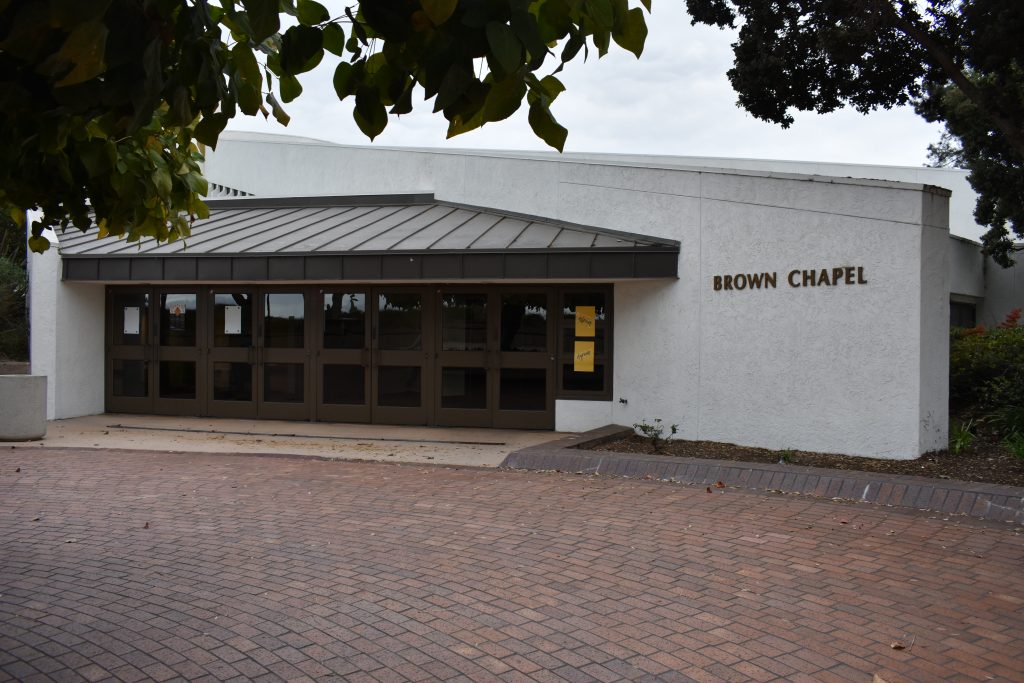Students petition for “diversity” in chapel speakers
By: Natallie Rocha and Marlee Drake

Everything on campus virtually stops at 9:45 a.m. every Monday, Wednesday and Friday as students scan in to hear the day’s chosen chapel speaker. Every year, dozens of speakers come from around the country to speak in PLNU’s Brown Chapel.
Recently, a group of students circulated a petition calling for a “diversity” in chapel speakers and another group planned to walkout on a Spiritual Renewal Week speaker, leaving the PLNU community to reflect on the purpose of chapel and its speakers.
For Alexis Faust, a senior studying media communications, she said the conversations following Spiritual Renewal week left her wondering how the university vets students and guests who speak at Brown Chapel.
“The school needs to realize that whoever speaks is influencing the whole student body and that’s major,” said Faust, who attends chapel about two times a week.
Faust said she, like many other PLNU students, chose to attend a Christian university to expand their faith. The University Chaplain and Director of Chapel Programming Esteban Trujillo said chapel serves multiple purposes for students’ spiritual lives.
“The purpose of chapel is a time for us to pause,” Trujillo said. “It’s a time for spiritual formation within a Christian college context in which you can be challenged in ways that will be stretching, encouraging and will also prepare you for life beyond college.”
Vice President of Spiritual Development, Mary Paul said that finding speakers with diverse viewpoints continues to be a priority in chapel.
“Within our chapel lineup of speakers we want to have different kinds of voices, different kinds of experiences,” Paul said. “Some of that is at the practical level since our student body is diverse, there’s not one particular voice that everyone within the community will be able to say ‘I connect with you.’”
Faust said that chapel speakers should challenge students’ viewpoints, open minds to new ideas and help our community “avoid the ‘Loma bubble.’” Faust said she believes the university effectively brings in diverse perspectives, but she can see how some students are taking issue with the way in which these ideas are presented.
Faith stories are a regular part of PLNU’s chapel schedule. But, as people present their story in front of dozens of students on stage, Faust said that the speaker’s delivery can make it seem like “like it’s the only one that matters.”
The chapel planning team selects the speakers for chapel and consists of several campus pastors along with the student-elected ASB director of spiritual life and chapel intern, who is appointed by the university. Together they set the chapel schedule before the semester begins.
Trujillo said the school cycles through four different themes each year and choose speakers who “would be great voices in [the theme].” This year’s focus in on a “holiness theme.”
According to Trujillo, the process of creating the schedule begins with set chapels that are either traditional or required, like the Easter service, homecoming or department chapel. After that, they add in community chapels and renewal week, then figure out speakers for the remaining time slots. This semester, Trujillo said the school has placed a particular focus on bringing in speakers from local churches.
When it comes to preparing the speaker’s message, Paul said chosen chapel speakers are given an information sheet that includes topics the chapel planning team asks them to not speak on, including denigrating higher education or issues around the LGBTQ+ community, particularly with the topic of same-sex marriage. She said the school doesn’t want chapel to be a place where they speak against the established beliefs of the Nazarene church.
Regarding recent controversies with the amount of politics on chapel, Trujillo said the petition and other student feedback helped him to understand the needs of the community, and he is available and accessible to continue the dialogue with students about their concerns. He said that chapel will continue to speak into social issues “because it is vital that our Christian faith engages in what is happening in our community and in our world,” Trujillo said.
“I wouldn’t ever say that we’re promoting a partisan agenda, but we will continue to speak into the ways our Christian faith informs our response to social issues,” Trujillo said.
Paul said that the issue stems in part from that, “We live in a milieu that wants to take away language as being owned by one group versus another group.” According to Paul, while the language of social issues in chapel may be political, they aren’t partisan.
“This is difficult nuance,” Paul said, “but there’s something different between being partisan and when you talk about political, because when you dig into the word, it’s much more about the laws and the practice of life together, and what rules your life and how that gets formed. That word is bigger than partisan.”
